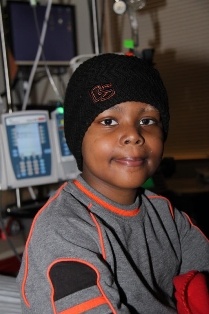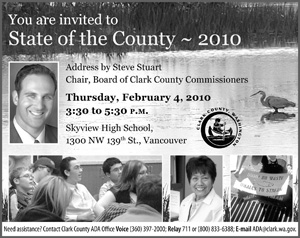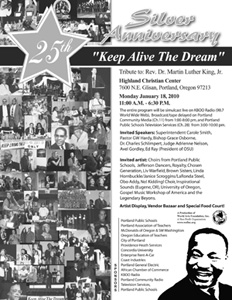 Isaiah Scott is 10 years old, and like other kid his age, he enjoys playing and watching sports. He also has a passion for playing video games. Isaiah has been playing fewer sports and more video games lately because of his stay at Doernbecher Children's Hospital. On Sept. 16, 2009, Isaiah was diagnosed with acute lymphoblastic leukemia (ALL).
Isaiah Scott is 10 years old, and like other kid his age, he enjoys playing and watching sports. He also has a passion for playing video games. Isaiah has been playing fewer sports and more video games lately because of his stay at Doernbecher Children's Hospital. On Sept. 16, 2009, Isaiah was diagnosed with acute lymphoblastic leukemia (ALL).
Isaiah's doctors informed his family that he would need a bone marrow transplant because he has a condition called hypodiploidy. A biological indicator—hypodiploidy means his cancer may continue to reoccur. Hypodiploidy is a specific abnormality inside a leukemia cell, where there are fewer than the normal number of chromosomes (normal is 46 chromosomes) found in the leukemia cell. This abnormality in a leukemia cell is associated with a worse outcome for the patient, compared to other patients who have leukemia without this abnormality. Therefore, patients with this abnormality in the leukemia cell often need more aggressive therapy to treat their leukemia, and bone marrow transplant is often the recommended therapy.
 Isaiah is mixed race, which lowered his odds of getting a marrow transplant match. For a successful transplant, a patient needs a matching donor. Special testing determines whether a patient and a bone marrow donor or umbilical cord blood are a good match. With a closer match, it is more likely the patient will have a positive outcome.
Isaiah is mixed race, which lowered his odds of getting a marrow transplant match. For a successful transplant, a patient needs a matching donor. Special testing determines whether a patient and a bone marrow donor or umbilical cord blood are a good match. With a closer match, it is more likely the patient will have a positive outcome.
Race and ethnicity matter. The markers used in matching are inherited, patients are more likely to match someone from their own race or ethnicity. Adding more donors and cord blood units from diverse racial and ethnic backgrounds to the Be The Match Registry increases the likelihood that all patients will find the match they need.
Your heritage can make all the difference. If you are from one of the following communities, you are especially encouraged to join Be The Match Registry or donate umbilical cord blood:
• Black and African American;
• American Indian and Alaska Native;
• Asian, including South Asian;
• Native Hawaiian and other Pacific Islander;
• Hispanic and Latino;
• Multiple race.
 On Dec. 28, 2009, Isaiah received a stem cell transplant by way of umbilical cord blood from a mixed race baby. The simple act of an umbilical cord blood donation from the newborn's family will help to improve and possibly save Isaiah's life. In the past, when a baby was born, the umbilical cord was thrown away. But today, blood from the umbilical cord can be collected after your baby's birth and donated to a public cord blood bank to help someone, like Isaiah, with a life-threatening disease.
On Dec. 28, 2009, Isaiah received a stem cell transplant by way of umbilical cord blood from a mixed race baby. The simple act of an umbilical cord blood donation from the newborn's family will help to improve and possibly save Isaiah's life. In the past, when a baby was born, the umbilical cord was thrown away. But today, blood from the umbilical cord can be collected after your baby's birth and donated to a public cord blood bank to help someone, like Isaiah, with a life-threatening disease.
Donating is simple and if you choose to donate umbilical cord blood, your labor and delivery are not affected. No blood is taken from your baby, only from the umbilical cord itself after your baby is born. To find out more about this special donation, visit www.BeTheMatch.org or call toll-free: 1 (800) MARROW2 (1-800-627-7692).
"The past few months have been very difficult for Isaiah and me, but after the cord blood transplant we both have a lot of hope for the future. We pray that the new cells he received via the stem cell transplant will give Isaiah his health back," says Isaiah's Mom. "We celebrate life everyday and are thankful for the parents of the mixed race baby who had the foresight to donate the stem cells from their baby's umbilical cord so that Isaiah can have the chance to live cancer free."
Isaiah is receiving blood and platelet transfusions as part of his treatment. Blood and platelet transfusions are critically important for people like Isaiah. Rare blood types are often found in African Americans. In addition to the common ABO blood types, some extremely rare blood proteins are found exclusively in the African-American population. Transfusions from donors of the same ethnic background help patients avoid complications. Blood and platelet donation can help cancer patients and bone marrow transplant recipients before, during and after their treatment.
The American Red Cross will host the Martin Luther King, Jr. Blood, Bone Marrow and Donor Registry Drive on Jan. 23 from 7:30 a.m. to 1 p.m. at the Portland Donor Center 3131 N. Vancouver Ave. Portland, OR 97227. To make an appointment to donate blood or platelets call 1-800-GIVE-LIFE (1-800-448-3543) or visit www.RedCrossBlood.org. While at the Red Cross you can donate blood or platelets and get registered for Be The Match and Donate Life Northwest, all in one convenient location.






















































































































































































































































































































